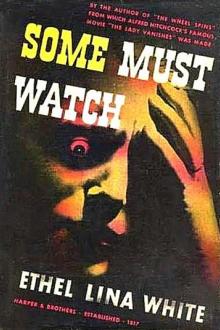Some Must Watch - Ethel Lina White (best book club books .TXT) 📗

- Author: Ethel Lina White
- Performer: -
Book online «Some Must Watch - Ethel Lina White (best book club books .TXT) 📗». Author Ethel Lina White
unfriendly eyes.
“What’s that to do with me?” she asked. “I ve thrown up the case.”
“You’re not really going?” gasped Helen.
“Directly I’ve packed my case. Miss Warren will hear, in the morning,
that I was dismissed by the domestic help.”
“But you can’t do that,” cried Helen, in a panic. “I’ll apologize.
I—I’ll do anything.”
“Shut up. I’m through with your promises. I’m going—and I’m going now.
That’s my last word.”
“But—where will you go?”
“That’s my business. I’ll find a place for the night. It is not so late,
and I’m not afraid of the dark, or a spot of rain.”
Nurse Barker paused, before she added maliciously,
“Once I’m out of this house, I’ll feel safe.”
She was taking her revenge, as she drove home the horror which Helen had
almost forgotten. The girl gazed at her with imploring eyes while she
gave a parting thrust.
“Keep your weather-eye open. She’s up to no good.” She glanced at her
bandaged thumb. “And while she’s out of the way you had better look for
her gun.”
Helen bit her lip as the bathroom door was shut in her face.
“She can’t really mean to go out in this awful storm,” she decided.
Besides feeling vaguely frightened, she was utterly perplexed, and
worried with a sense of her own responsibility. As it was impossible to
guess what purpose had drawn Lady Warren from her bed, it seemed
hopeless to try and find her. She might play hide-and-seek indefinitely
in that house.
She might even be bent on committing suicide. Not only was she old, but
her life held that dark unexplored corner. Remorse might drive her to
kill herself.
Helen shuddered at the thought of finding her body hanging in the
cellar. Not knowing where to go first, she went back to the blue room.
Her first glance at the bed told her that the dummy had acquired a more
definite shape; and, when she drew nearer, she saw Lady Warren peeping
at her with black slitted eyes.
“Oh, where have you been?” asked Helen.
“In the Land of Nod,” was the innocent reply. Her inscrutable stare
dared the girl to disbelieve her statement. Feeling that it was hopeless
to persist, Helen returned to her chair.
“Has the nurse gone?” asked Lady Warren.
“Tomorrow,” replied Helen.
“Quick work. I soon clear them out. I hate them. Always washing your
face… Don’t move, girl. I want to keep my eye on you.”
Helen thought involuntarily of the hidden revolver; and, with her
characteristic urge for information, she had to refer to the subject.
“Mrs. Oates tells me you used to shoot a lot,” she said. Lady Warren
threw her a sharp glance before she replied.
“Yes, I used to pot game. D’you shoot?”
“No. I think it is cruel”
“Yet you eat meat. If everyone had to kill their own meat, nine-tenths
of the population would turn vegetarian within a week… I did my
job properly. I didn’t wound. I killed.”
“But you took life.”
“Yes, I took life. But I never gave life. Thank God… Get out of my
room.”
Helen started, and then turned her head in the direction of Lady
Warren’s pointing finger, Nurse Barker had entered the room. Without
speaking, she marched to the dressingroom, where her belongings were
stored, and shut the door.
As Helen strained her ears, she could hear her moving about, opening and
shutting drawers. Apparently she wasmaking good her threat, and packing
her suitcase, As she sat in the oppressive room she was the victim of a
morbid suspicion, bred of the close atmosphere.
Long ago, two girls had died unnatural deaths in this house. But no one
knew the actual truth about the tragedies. It was smothered in
conjectures, and buried in a vague Coroner’s verdict.
“She’s queer,” thought Helen, glancing uneasily towards the bed.
“Suppose she killed them—and her husband knew. Suppose—she shot him, so
that he couldn’t tell.”
Presently, she realized that the sounds from the adjoining room had
ceased. With a rush of hope, she remembered that there was a divan in
the dressingroom. The probability was that Nurse Barker had decided to
put off her departure until the morning, and was going to bed.
The fact that she was so near inspired Helen with confidence. As she
reviewed the events of the evening, she saw her present position as the
logical result of her own folly. Nurse Barker had been specially
selected, by the Matron of the Nursing Home, to look after a tiresome
patient, with whom, she herself, could not cope.
Helen felt overwhelmed with humiliation.
“If she’s not asleep, I’ll go in and tell her I’ve been a horrible
little brute,” she decided, “I’ll ask her to wipe her boots on me.”
Creeping across the carpet to the dressingroom, she cautiously opened
the door-now unlocked. Then she gave a little cry of dismay.
Nurse Barker had gone.
ALONE
Helen stared around her with startled eyes. The disorder of the room
pointed to a hurried departure. Drawers had been pulled out, while a
suitcase and umbrella lay upon the table.
“She’s not gone yet,” thought Helen.
But a moment’s reflection robbed her of that hope. Nurse Barker would
naturally leave her heavy luggage behind, to be forwarded to the Home.
An umbrella, too, would be useless in the gale.
Feeling sick with suspense, Helen opened the wardrobe. Nurse Barker’s
outdoor uniform no longer hung upon the peg. A hurried search through
the chest, showed all the drawers to be empty. All that remained was a
collection of cigarette ends and ash.
It was a planned desertion. With deliberate mental cruelty, Nurse Barker
had left the girl alone—reaching the landing through the Professor’s
room.
Helen felt almost overwhelmed by this last blow. Throughout the evening
she had noticed the steady march of events towards some inevitable
climax. While she dimly felt its objective was her own isolation, she
had played into the hands of destiny by goading on Nurse Barker to take
her revenge.
Yet, even so, she had been forced to make her moves, as if she were a
puppet controlled by another will.
“I’m all alone,” she thought fearfully.
It was true that others were still in the house; but hers was the only
active brain—hers, the only quick body. The others were shackled by
fetters of flesh.
With a desperate need of company, she opened the sec ond door, and
entered the Professor’s room.
But there was no comfort here—only an increase in loneliness. The
Professor—still holding his rigid posture, as though carven in
stone—was too much like a corpse awaiting burial…
She wanted to leave him, yet she dreaded returning to the blue room. The
old woman lacked the human quality, for which she hungered. At this
crisis she would have welcomed the harshest abuse from Nurse Barker,
could have drawn her back.
The longing to hear another voice grew so acute that she went out on the
landing and beat frantically upon Miss Warren’s door.
“Miss Warren,” she screamed. “Help.” But there was no response. She
might have been appealing to a sealed tomb. Only the wind shrieked, as
though a flock of witches sailed overhead, racing the moon,.which spun
through the torn clouds like a silver cannon-ball, shot into Space.
“She’s cruel,” whispered Helen, turning away.
But Miss Warren was too soundly asleep to hear her cries. Contact with
others always gave her the impression that her nerves were drawn through
her skin, and exposed to the open air. Tonight, after all the accidents
and alarms, she felt as though each fibre were actually bruised.
She had the natural cravingof a recluse for her own locked study.. But
she had been picked out of her shellmade to endure hours of enforced
companionship with an unpleasant old woman, in a lethal atmosphere.
The storm, too, had played havoc with her nervous system. The accident
to her door-handle, which had imprisoned her, therefore, came as a
welcome release from responsibility. She made no effort to free herself,
but slipped her bolt, and shut out the World.
With plugs of cotton-wool in her ears, and blankets piled over her head,
to deaden the noise of the gale, she was soon submerged in the
slumber-sea of utter exhaustion.
Although Helen felt perilously near to collapse, her will still
functioned—telling her that she must not yield to panic. She reminded
herself that all the wires were not cut. She was still linked up with
civilization. But, as she went downstairs, she realized how hopelessly
she had become entangled in the snare of fear. She could not ask anyone
to come to the house because she dared not draw the bolts.
The Professor had laid down the command that the door must not be
opened; and the order had been dictated by a cool brain, which prepared
for every contingency. His policy had been framed in the interest of the
general safety.
Since then, Nurse Barker had warned her against any disobedience; and
Helen had learned—through bitter experience—that, in the case af Lady
Warren, at leastshe had been right.
If she—herself—were the ultimate aim of same dark Desire, then this
steady withdrawal of defence was planned to plunge her into such panic,
that, if she heard a knock, she would rush to open the door.
Someone wanted to draw her outside the safety of the Summit.
“If I arranged a signal-knock,” she thought, “it wouldn’t be safe.
Someone might be listening-in. No. It’s hopeless.”
Yet she knew that the mere act of talking to another person would act as
a tonic to her flabby nerves. She did not know whether Dr. Parry had
returned; her mind was too confused to calculate time or distance. But,
if he were still absent, she could ring up someone else.
“The Nursing Home,” she decided. “I’ll tell them about Nurse Barker, and
ask them to send an another nurse.”
The fact of having a definite message to send steadied her. Once more,
she was Miss Capel, whose name was only to familiar to the Employment
Bureau and not a stranded nonentity. With a touch of her former
assurance, she took off the receiver.
To her dismay, there was no responsive tinkle; no humming along the wire
told her that she was linked up with the Exchange; no voice inquired her
Number.
The telephone was dead.
She looked around the hall with frightened eyes. She knew that there was
a natural explanation of the silence. The country lanes must be blocked
with poles and wires, wrecked by the fury of the gale. This was no human
plot—it was an Act of God.
But Helen would not admit it. This faithful accompaniment to the
thrill-drama—the cut telephone-wire—had arrived with too-perfect
timing.
“It’s not accident,” she told herself. “Things don’t happen all together,
like this.”
She did not know where to feel safe, so great was her fear of the house.
Yet she dared not rush into the storm, lest she should make the very
move which had been planned, by the anonymous player, at the beginning
of the game.
“I’d better go back to Lady Warren,” she thought. “After all, I took her
an. She cannot be left.”
She went through the Professor’s room, in a wild hope that he might
yet awaken from his drugged sleep. With his cool brain to take control,
she felt she would face any danger.





Comments (0)